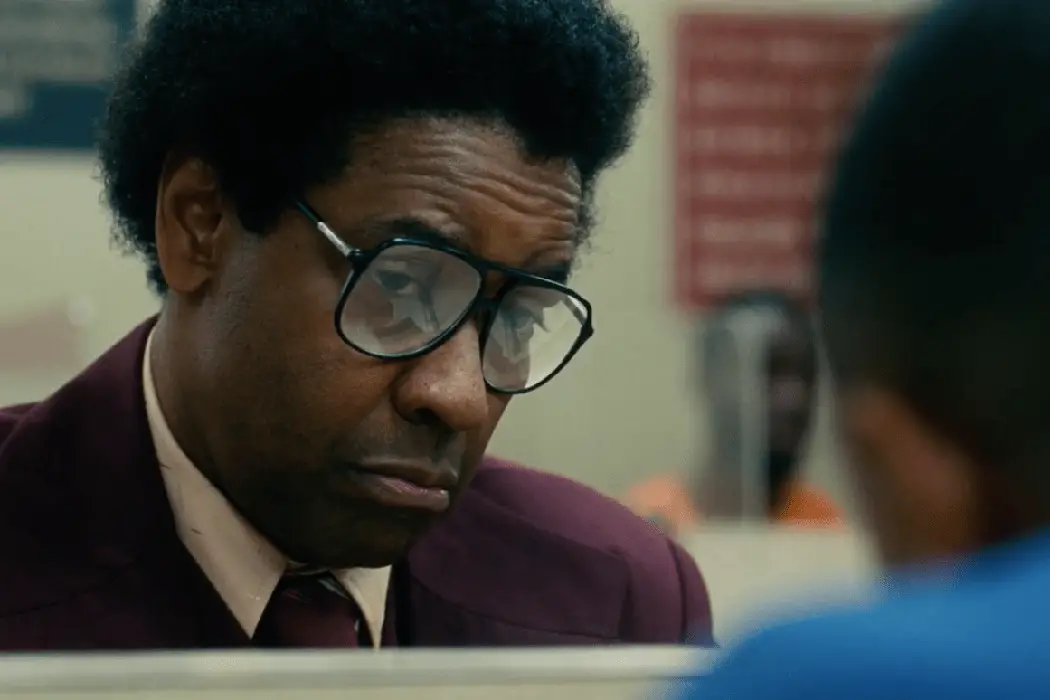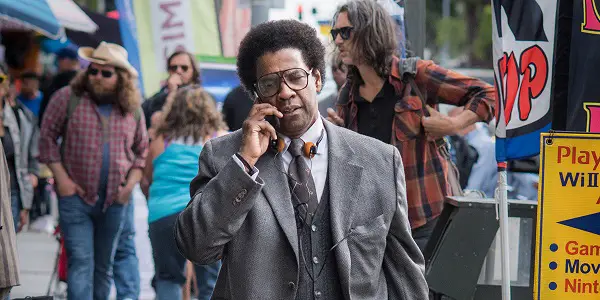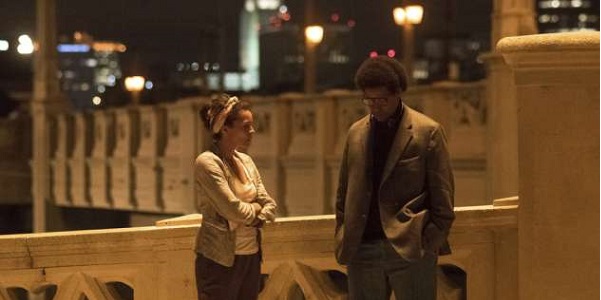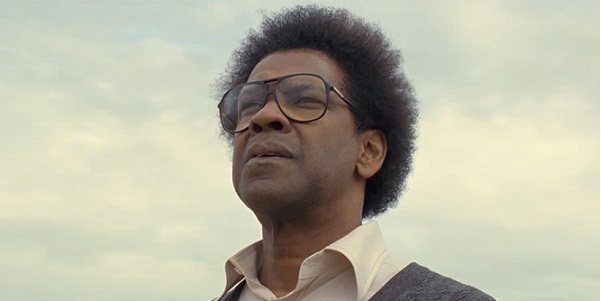ROMAN J. ISRAEL, ESQ.: Dan Gilroy Takes A Sharp Shift In Tone

Hazem Fahmy is a poet and critic from Cairo. He…
It seems off to describe Dan Gilroy’s directorial debut, Nightcrawler, as a breath of fresh air. The film displayed a potent cynicism in its investigation of ambition and the moral failings of the media, uncovering the foul side of the news cycle and its unquenchable thirst for drama, no matter the human cost. It’s a damn good film, but one that will leave you feeling very bad about the capitalization of human tragedy, and how far the fourth estate is willing to go to twist the truth for views.
Gilroy’s sophomore feature, Roman J. Israel, Esq., could not be more tonally different. The, often comic, legal drama follows our titular awkward hero, played perfectly by Denzel Washington, a middle-aged lawyer whose entire professional life is but a bitter hangover from the revolutionary spirit of the seventies.
Roman has spent decades behind the desk of his longtime partner, refusing to appear in court due to his extremely low tolerance for bullshit. His quiet life gets immediately rocked when his partner experiences a sudden heart attack that puts him in a coma, forcing Roman to close down the barely sustainable firm and look for work elsewhere. Out of a job for the first time since forever, he finds himself questioning his life’s work as well as the assumptions he had always held about the power of the law.

Despite the much more hopeful tune of Roman J. Israel, Esq., it often felt like an attempt at a spiritual successor to Nightcrawler. Both films are set in Los Angeles, and feature the city, its aesthetic, life and troubles prominently in their narratives. Both center on characters who feel like outcasts in their respective fields, and feel they are criminally underappreciated.
Most importantly, both commit to untangling and subverting archetypical narratives of success and the pursuit of happiness, giving us main characters whose motives and methods are questionable to say the least. The films feel like two sides of the same coin, exploring an extremely similar thematic and narrative structure, but differing completely in their tone and factoring of morality. Whereas Nightcrawler gave us a completely immoral antihero whose sole motivation was success (a success built on deception, no less), Roman J. Israel, Esq. gives us a hero whose struggle lies in his pursuit of morality and truth.
Sophomore Slump
But sadly, Roman J. Israel, Esq. fails to match Nightcrawler’s incisive interrogation. The film feels haphazardly put together, shining in certain parts, and falling completely flat in others. Much of this comes from its disproportionate script work. Roman is fleshed out competently and extensively.
Over the course of the film, we thoroughly understand his motivations and ticks. We spend ample time with him and get to know his habits and quirks; we become intimately familiar with his love for music, specifically black legends like Gil Scott Heron and Marvin Gaye, we see the bizarre way he eats his peanut butter and jelly sandwiches, we notice how we avoids eye contact in confrontations.
This focus on Roman works out exceptionally well in the second act when the film leans more towards Gilroy’s penchant for suspense. The sound design is exceptional in these later sequences, transforming Los Angeles into a cacophony of unsettling noise, highlighting the turmoil and paranoia Roman begins to suffer from. This is all well and good, and it fleshes out the character expertly, but the surrounding world, in contrast, feels wildly underdeveloped.

The most glaring, and absurd, piece of missing context in the film is its complete lack of commentary on the contemporary political landscape. Roman’s melancholy stems from his disillusionment with the revolutionary spirit of his youth, with how little has changed over time. And yet, the film feels foolishly atemporal in its politics, refusing to drop a single concrete reference to the Trump era, whether to its overt and violent racism or to the heightened cultural resistance movements such as Black Lives Matter have championed. There’s a brief scene in which Roman is having dinner with Maya, a young activist played by Carmen Ejogo, and she mentions something about “the time we live in”. And that’s it. The subject never comes up again, nor does it impact the characters in any other way.
This peculiar absence of contemporary commentary, made even weirder by the fact that the film was shot in 2017, totally holds back the film from a greatness it could have very much achieved. I was dying to know how someone like Roman, who had spent the greater deal of his life fighting for civil rights, would react to a Trump victory? Could it have been the source of his disillusionment or had it simply compounded it?
This is especially relevant given that much of Roman’s disillusionment with the causes he once fought for stem from his alienation from society. His initial isolation is as material as it is existential: he carries a flip phone, always has on his fuzzy orange headphones, which are connected to his ancient iPod, and sports a disastrously unfashionable suit every day to work.
Out of Time, Out of Mind
When Roman inevitably clashes with a group of young people, it comes as no surprise. In one of the most effective scenes in the film, Roman is addressing a group of young activists at the behest of Maya, when he interrupts himself to object to men in the crowd sitting down when some women have no seats. Of course, the women call him out on his patriarchal comments, but he simply asserts that he is being “polite”. Things escalate and he escapes, unable to handle the confrontation.
This scene cuts to the very heart of the film: how does one stay true to their beliefs and principles in a world that is constantly changing around them? But the impact of the scene is wasted by a complete lack of focus on political context. Again, we get a simple comment from Maya in the following scene, something about “the discourse these days”, but the incident receives absolutely no attention onwards, not even as an afterthought.

We have no clue what Roman got out of it: does he stick to his guns and continue to believe that his outdated notions of “chivalry” are still relevant? Or does he begin to grow and understand that believing in justice and equity means being willing to accept that you, too, can be part of the problem?
My best guess is it’s the latter, as it only takes a few more scenes for him to sigh: “I’m tired of doing the impossible for the ungrateful.” The line is meant to represent Roman’s genuine woe at the world, but since we don’t see much context after his confrontation with the activists, it comes across as a deeply troubling one. It is immensely problematic to dismiss a genuine call-out as a mere absence of gratitude, and this downplays our empathy for Roman’s situation.
It doesn’t help that the supporting cast also feel woefully underdeveloped in contrast to Roman. It was nothing short of shame to see two actors as talented and dynamic as Ejogo and Collin Farrell being given such little room to flesh out their characters. It was particularly hard to get a read on Farrell’s character, the younger and much more successful George Pierce. By the time the credits roll, one can assume that he used to be a well-meaning lawyer who went corporate only to find his moral calling later, but this feels disingenuous throughout the film itself. He fluctuates rapidly between wide-eyed law school nostalgia and being a cold-hearted bastard. It’s unconvincing.
Verdict: Roman J. Israel, Esq.
Still, if nothing else, Roman J. Israel, Esq. is worth seeing if only for Washington’s excellent and completely out-of-type performance. Much of Washington’s filmography has been defined by über-confident roles in films like Training Day, Malcolm X, American Gangster, and The Equalizer, and it’s fascinating to see him take on an extremely anxious character such as Roman.
It may fail to live up to the excellence of Gilroy’s debut, but the film still manages to deliver a poignant look at the pitfalls, and promise, of the American legal system. For what it’s worth, I still can’t wait to see what Gilroy does next.
What are your favorite legal dramas?
Roman J. Israel, Esq. is currently in theaters in the U.S. and the UK. For a list of full release dates, see here.
Does content like this matter to you?
Become a Member and support film journalism. Unlock access to all of Film Inquiry`s great articles. Join a community of like-minded readers who are passionate about cinema - get access to our private members Network, give back to independent filmmakers, and more.
Hazem Fahmy is a poet and critic from Cairo. He is an Honors graduate of Wesleyan University’s College of Letters where he studied literature, philosophy, history and film. His work has appeared, or is forthcoming in Apogee, HEArt, Mizna, and The Offing. In his spare time, Hazem writes about the Middle East and tries to come up with creative ways to mock Classicism. He makes videos occasionally.













